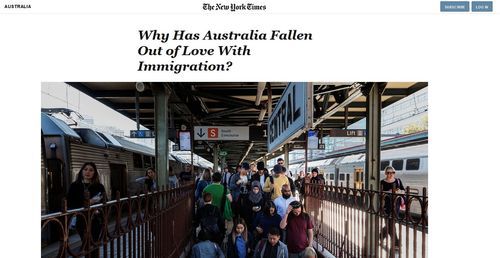


04/24/2019
From The New York Times:
Why Has Australia Fallen Out of Love With Immigration?
By Damien Cave and Isabella Kwai, April 22, 2019
SYDNEY, Australia — Five days after 50 Muslims in New Zealand were killed in an attack attributed to an Australian white supremacist, Australia’s prime minister, Scott Morrison, unveiled a plan he said would address a fundamental challenge to the nation.
But it was not a proposal to combat hate groups and Islamophobia. It was a cut to immigration.
The government’s plan, which had been in the works for months, is a potential turning point for a nation that has been shaped by newcomers since its days as a British penal colony and that has presented itself in recent years as a model of how immigration, properly managed, can strengthen a country.
Now, amid a global backlash against immigration that has upended politics in the United States, Britain and much of Europe, even Australia is reversing course, turning away from a policy of welcoming skilled foreigners that helped fuel decades of economic growth — and transformed a nation once closed to nonwhite immigrants into a multicultural society.
Mr. Morrison presented the move as a reaction to crowding in the nation’s largest cities, which has led to congested commutes and costlier housing. “This plan is about protecting the quality of life of Australians right across our country,” he said.
Such concerns are widespread as views in the country have turned sharply against population growth over the past year. There is worry, though, that these “quality-of-life” complaints have been amplified by — or perhaps have masked — a deeper ambivalence about a new wave of non-European immigration, especially from Muslim countries, along with Africa and Asia. …
Many Australians say it is time for these trends to end. In one recent poll, more than two-thirds said their country no longer needed more people. As recently as 2010, a majority of Australians disagreed with that statement. …
Instead, based on the nationwide polling, the place where residents were least likely to be opposed to population growth was Surry Hills, an inner suburb of Sydney where housing prices have skyrocketed and traffic can be suffocating. …
Some residents of the area justify their opposition by asking whether Australia has enough water to support a larger population, an element of the country’s immigration debate since the 1980s, before desalination plants became more common.
Obviously, only white racist xenophobes believe in the Climate Change hoax. Everybody knows the solution is for Australia to keep importing millions of people and burn lots more fossil fuels to power more desalination plants.
But there are also people like Stephen Ryan, 69, a retired power station worker who was not shy about arguing that Australia was better off when its immigrants were mostly from England.
A woman praying at a mosque in an Adelaide suburb. Right-wing politicians critical of Islam have pushed racism into mainstream public discussion.
“The Arab people, they don’t want to do anything,” he said. “They just want to go on the dole. That’s just the way I see it.”
It is the kind of attitude that, according to many immigrants in Australia, still shapes the discussion around population growth in a country that barred nonwhite immigrants until 1971.
The rise of right-wing politicians like Fraser Anning, a senator who blamed Muslim immigration for the New Zealand attacks, and Pauline Hanson, who once wore a burqa in Parliament to protest Islam, has pushed racism into mainstream public discussion.
“In the last few years, we have seen politicians state that people had a right to be bigots,” said Tim Soutphommasane, a former race commissioner in Australia and a professor at the University of Sydney. “There’s been a creeping normalization of far-right political ideas.”
On a local level, two competing visions of Australia are essentially fighting for votes: the Australia longing for a nostalgic past, and the Australia trying to figure out the next phase of integration for a more globalized nation.
Young political candidates like Kadira Pethiyagoda are at the forefront of potential change.